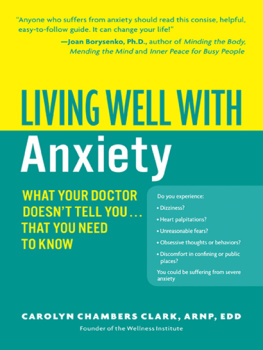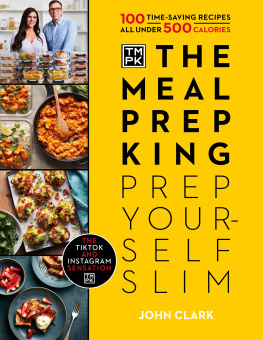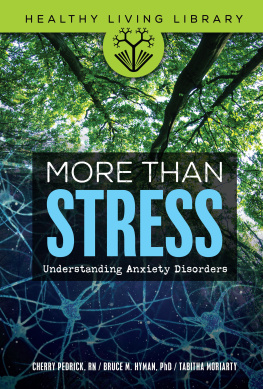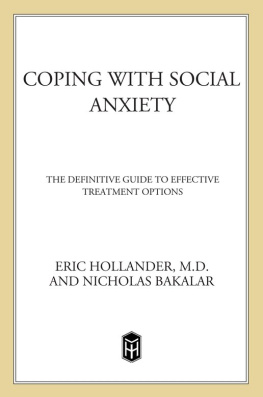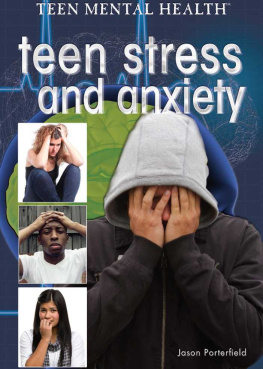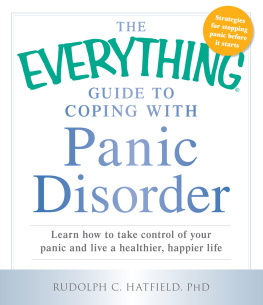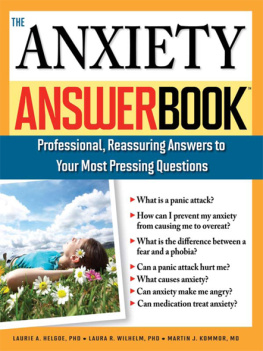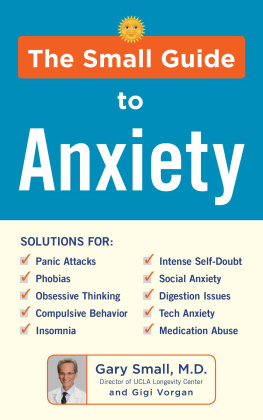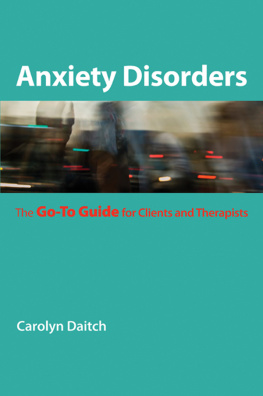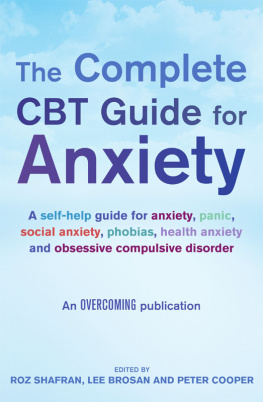CAROLYN CHAMBERS CLARK, ARNP, E D .D.
A nxiety conditions are the number-one mental health problem among American women and are second only to alcohol and drug abuse among men. The frequency of anxiety is also increasing among children, and it contributes to decreased social connectedness (divorce, living alone, decreased birthrate, marriage later in life). Increases in physical or psychological threats (violent crime, worry about nuclear war, fear of diseases such as AIDS, and the entrance of more women into the workforce) are identified as significant factors in the upswing of anxiety.
Approximately 10 percent of the population of the United States, or more than 30 million people, suffer from anxiety disorders each year, yet only a small proportion receive treatment. Many who suffer from high anxiety are too embarrassed or ashamed to discuss their anxieties. For many people, this book may provide the only help they will ever receive.
Lets take a look at some of the varied conditions that result from uncontrolled anxiety.
Hillary wakes up every night a couple of hours after going to sleep, her heart racing, feeling dizzy, with a tightness in her throat, and fearful something terrible is going to happen.
Joe just got a promotion because of his Internet sales ability. Now he must contribute to group sales meetings and he knows hes going to be tongue-tied, stammer instead of speak coherently, and get so restless he wont be able to sit still.
Ruth, a bank teller, has been forcing herself to go to work, and once she gets there, shes afraid she might say or do something silly, and want to leave.
Adam just entered college, and hes afraid to speak up in class, even though he knows the answer, and he freezes when he has to take a written exam.
Sylvia was raped a year ago. She continues to have repetitive distressing thoughts about the event, as well as nightmares, flashbacks, and emotional numbness.
Why Anxiety Is Such a Problem Today
Anxiety conditions appear as a result of cumulative stress over time. Individuals in Western societies experience more stress than ever before. As a result, they experience more anxiety. The increased pace of modern society, the increased rate of technological change, the relative absence of traditionally prescribed values, a barrage of inconsistent worldviews presented in the media, terrorism threatsthese and other factors make it more difficult to remain calm and to experience a sense of stability or consistency in their lives. The result is increased stress and anxiety. As anxiety continues to mount in our society, this book can provide the comfort and specific direction anxious individuals need.
A Traditional Medical Approach May Not Be Enough
For most anxiety-related conditions, the best that medicine can do is keep some of your symptoms at bay, and even that claim is questionable. The more we learn about the medications used to treat anxiety, the more we learn that these drugs often have unwanted effects that are worse than the anxiety itself.
The root cause of anxiety is rarelyif everaddressed in a medical model. Only the symptoms are treated. That means you may never learn the source of your anxiety, and, as you may have already discovered, fear of the unknown brings on the worst kind of anxiety.
You may be fearful your anxiety is untreatable, or that it means you are crazy, or on your way to a lifetime of hospitalization and treatment. You may be fearful your anxiety may build into dramatically worsening conditions and phobias. You may be fearful that even though youre learning to deal with your anxiety, you suspect that new symptoms will appear and you will be unable to control them. You may be fearful that for the most part, doctors, unless they are psychiatrists, think youre faking it, or that your problems are all in your head. You may be fearful because most doctors dont have an answer when you ask if your anxiety is going to affect your family, work, and friends. You may be fearful that, over time, your anxiety is going to lead to other, more dangerous, conditions such as heart attacks, suicide, or even cancer. You may be afraid that you will never be able to overcome your anxiety, that you cannot stop its inexorable march as it seems to envelop and overtake every facet of your life. You may be afraid that there are no answers, no cure, no respite from the discomfort you feel and that no one really understands what youre going through.
Rest assured, there are answers, and there are ways you can learn to reduce your anxiety.
You just arent likely to hear them from the typical HMO or primary-care physician, who may not even recognize or diagnose your condition, much less know how to treat it, especially now that typical HMO appointments are mandated to end in fifteen minutes or less.
You may not be able to obtain an answer from the average psychiatrist, either. These doctors must rush through dozens of patients a day, prescribing drugs and monitoring their effects. They simply dont have the time, and sometimes dont have the know-how, to delve into the complicated and connected conditions anxiety evokes.
And even those medical doctors who consider themselves experts in treating anxiety rarely venture into the uncharted territory of dealing with the source of anxiety. Most are content to focus on treating the symptoms of anxiety, not the source. They are comfortable prescribing anti-anxiety drugs, but ask these doctors how to help you remove the source of your anxiety and they will probably draw a blank.
Why I Wrote This Book
My masters degree is in psychiatric/mental-health nursing and my minor at the doctoral level was psychology. My major in my doctoral program was educationspecifically, novel methods of teaching and learning. I am also board certified as an advanced holistic/wellness practitioner.
Over the years Ive experienced high degrees of anxiety due to graduate school stress, performance anxiety (when I first started to make presentations to large audiences), a fear of heights (after I was almost pushed off a second-floor balcony), as well as the many stresses and strains of our society that create anxiety. As a result, Ive had to learn how to reduce my stress, and thereby my anxiety. Ive also taught many of my clients wellness procedures Ive developed for reducing stress and enhancing calm through my Wellness Institute workshops, my private clinical practice, and on my website, http://HolisticHealth.bellaonline.com.
A wellness approach to anxiety focuses not only on the mind but also on the body and spiritthe whole person. Ive personally and professionally explored alternative and complementary methods for reducing anxiety, including cognitive-behavioral approaches, yoga, relaxation therapy, affirmations, coping skills, environmental changes, herbs, and nutrition. I wrote this book because anxiety pervades all our livesand because you need to know how to reduce it if you want to live well.

